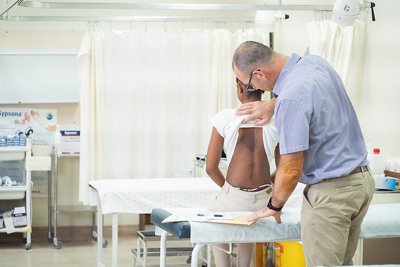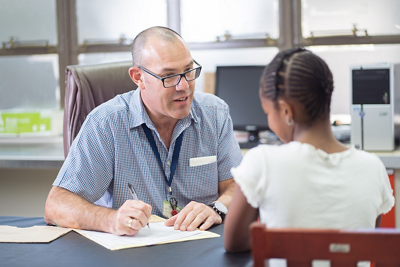Mediclinic continues to advance human rights by partnering with the state sector in offering healthcare to more South Africans.


Until recently, 16-year-old Noxolo Makhaza, a learner at Windsor Secondary School in Ladysmith, hated looking in the mirror. “It made me sad,” she says. “I knew I was different from my classmates because my spine was crooked.” Although her family and friends were kind, she knew there was something seriously wrong with her back. “I found it difficult to run or jump and I had pain when I slept,” she recalls. “But most of all I always wanted to change the way the way I looked.”
Two years ago, Dr Alberto Puddu, a spinal surgeon at Greys Hospital, a public healthcare facility in Pietermaritzburg, diagnosed Noxolo with scoliosis. This is a three-dimensional deformity of the spine that can be corrected with major surgery, improving the patient’s wellbeing and self-confidence about their appearance. The problem is that state patients like Noxolo are subject to long waiting lists due to surgical backlogs. A high burden of disease and trauma cases means state hospitals often have to shift elective (non-emergency) patients off their theatre lists, so their surgery is delayed.
Although scoliosis surgery is not considered an emergency, if the condition goes untreated, it can worsen throughout adulthood into a severe deformity that damages the patient’s quality of life. In some cases, untreated scoliosis can progress to the point of pushing against the heart and/or lungs, causing cardiopulmonary problems.
Surgical backlogs in public sector
“Doctors in state hospitals are usually really committed to the cause [of our patients],” says Dr Puddu. “We want to make a real difference and we’re committed to serving underprivileged patients in an academic environment.” While Greys Hospital offers exceptional specialist skills, a catchment area of more than 4.5 million people means it simply has too many patients.
The demand for beds at Greys Hospital is extremely high, Dr Puddu confirms. “I knew I had the capability to operate more – but I needed more theatre and ICU time,” he explains. “Spinal patients also require excellent postoperative high care to ensure their pain is controlled effectively. That’s why I reached out to Mediclinic for assistance, to see if we could work together.”
Commitment to help
Good things are happening as a result. Mediclinic is now committed to covering the costs of nursing and intra-operative consumables, plus the pre- and post-operation bed and care for 26 spinal surgery patients from Greys Hospital. Eminent anaesthetists in the state sector, Professor Reitze Rodseth and Professor David Bishop, have also volunteered their valuable time and expertise for the cause.
To date, Dr Puddu has operated on eight state patients, including Noxolo, at Mediclinic Pietermaritzburg. All these spinal patients received one-on-one postoperative nursing care in the high care ward and were transferred back to Grey Hospital via ER24 private ambulance once their pain was under control.
Legacy of partnering
This arrangement is by no means unique, as Mediclinic has a long legacy of partnering with the state sector to alleviate waiting lists. “These collaborations are about far more than addressing surgical backlogs – they’re about touching lives and, in some cases, saving lives together,” says Bob Govender, Industry Affairs Executive of Mediclinic Southern Africa. “Our ongoing involvement in public-private initiatives also means we have the opportunity to add collaborative value beyond our traditional patient base.”
To date Mediclinic has assisted more than 800 state patients requiring medical procedures – ranging from ENT to urology, cataracts, orthopaedic surgeries, and more.
Following her surgery in October 2022, Noxolo has a new lease on life. “Today I love jumping and playing soccer,” says the bubbly teen. “And I really like looking in the mirror!” For Dr Puddu and others involved in ongoing collaborations between private and public health, this makes everything worthwhile. “It's so rewarding when a patient comes in smiling and walks up to you and gives you a hug,” he says.
With Human Rights Day on the horizon, Govender provides a timely reminder that all healthcare stakeholders need to work together in relieving the pressures experienced in the public sector. “It must remain a priority for everyone in the healthcare sector to find South African solutions to our healthcare challenges,” he says.
